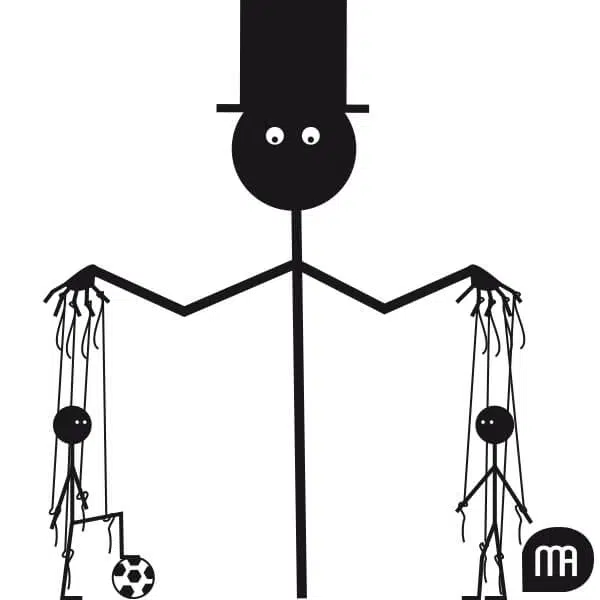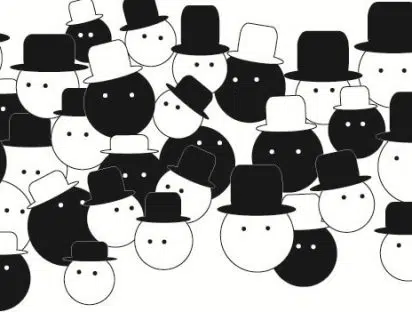
1.
Argument of indifference
According to this argument, the choice to play for time may be irrelevant. The “play for time” (contrary to the normal course of events) or “continue to play normally” options remind us of the story of Buridan’s ass which is starving to death and cannot bring itself to choose between two equally appetising piles of hay the same distance away. Let us consider the game of football, which inspired the expression “playing for time”, and imagine that a team that obtained a small but decisive advantage shortly before the end of the game decides not to play normally anymore, but to temporise. There are different ways to justify the hypothesis that “playing for time” can weaken it (we discuss several possibilities below). One of them is that this team leaves an enterprising state of mind to give way to an attitude of withdrawal (in the physical sense of the word). On the other hand, continuing to play normally would be tantamount to exposing oneself to a reversal of the situation, with the other team seeking to cancel out the advantage of the first. It could be argued that both options are equal. In other words, whatever their choice, the team may not regret not having chosen the other option available to them. “There is no need to consider our motives,” the team that took the advantage would think, “since the two options are equivalent: so we can make an arbitrary choice.” It is from this arbitrariness that the paradox would come.
2.
Counterproductive effects
The second paradox arises from the idea that if the strategy of “playing for time” is supposed to temporise, it can have negative consequences for the agent. However, the positive consequences of this strategy come first to mind. Let us consider this statement by Seneca on how to remedy the harmful effects of anger:
“No one makes himself wait: yet the best cure for anger is waiting, to allow the first ardour to abate and to let the darkness that clouds the reason either subside or be less dense. Of the offences which were driving you headlong, some, an hour will abate, to say nothing of a day, some will vanish altogether; though the postponement sought shall accomplish nothing else, yet it will be evident that judgement now rules instead of anger. If ever you want to find out what a thing really is, entrust it to time; you can see nothing clearly in the midst of the billows.” (1)
But the opposite effect can be plausibly observed. The strategy of “playing for time,” especially if it is suddenly “decided,” can cause emotional distress. The fact of imagining that we are applying this strategy leads to making the intended end (victory in football) more salient than it was when things were going according to their normal course. This emotional state could have counterproductive effects. What is the emotion in question? Remorse, “a strong feeling of sadness and regret about something wrong that you have done,” is a credible candidate. It can disrupt the agent’s course of action and prevent him from achieving his goal. This is the second form of the paradox.
3.
Deviation from the normal course of events
The third form is similar to the previous one. Let us take the example of football again. In the normal course of events, players would practise their art in the usual way, alternating attack and defence. But when the course of events becomes abnormal, the team that caused it (the one that wants to retain its advantage) may only think about its advantage. Rather than just trying to get it, it tries to get it at all costs. The philosopher Robert Pirsig gives an eloquent illustration of this – outside the game of football. Here is what he says about the experience of Phaedrus, the protagonist of one of his novels, who undertook a pilgrimage to India on a holy mountain:
“To the untrained eye ego-climbing and selfless climbing may appear identical. Both kinds of climbers place one foot in front of the other. Both breathe in and out at the same rate. Both stop when tired. Both go forward when rested. But what a difference! The ego-climber is like an instrument that’s out of adjustment. He puts his foot down an instant too soon or too late. He’s likely to miss a beautiful passage of sunlight through the trees. He goes on when the sloppiness of his step shows he’s tired. He rests at odd times. He looks up the trail trying to see what’s ahead even when he knows what’s ahead because he just looked a second before. He goes too fast or too slow for the conditions and when he talks his talk is forever about somewhere else, something else. He’s here but he’s not here. He rejects the here, is unhappy with it, wants to be farther up the trail but when he gets there will be just as unhappy because then it will be ‘here.’ What he’s looking for, what he wants, is all around him, but he doesn’t want that because it is all around him. Every step’s an effort, both physically and spiritually, because he imagines his goal to be external and distant.” (2)
The football team that plays for time certainly does not aim for an “external and distant goal” but because of the obstinacy generated in the minds of its players by the long way to go, the “playing for time” leads them to refuse to be there. “He’s here but he’s not here” because he “want[s] to be farther up the trail” expresses the third form of the paradox.
4.
Passive action
The fourth form consists in affirming that by playing for time, an agent commits a “passive action.” The idea that an action can be passive seems intrinsically contradictory, since the two principles it contains – activity and passivity – are antonymous. Passivity can be defined as the absence of activity, which can include different meanings, for example to be “acted upon by an external agency,” to be inert like an inanimate object, or to “endure without resistance” (3). However, passive action is discussed in philosophy. Joseph Raz gave two examples that highlight the difficulty in distinguishing activity from passivity: the ornithologist, more precisely the one who observes wild birds, and the kleptomaniac, who is subjected to the irrepressible desire to steal (4). The bird-watcher, Raz says, remaining “still in his observation hide-out, is active. [But] in a familiar sense he is of course passive.” If the bird-watcher is active, it is because he intentionally waits for birds to pass. If he is passive, it is because he seems to produce no effect in the world. The kleptomaniac also appears to be both active and passive. He’s active because he’s stealing something from a store. He is passive because his action is produced by an irrepressible desire, a desire that he does not control. Harry Frankfurt stated that the sole criterion for an action is that its completion is subject to the agent’s control. This is where the fourth paradox of the “playing for time” strategy would appear. By implementing it, the football team wishes to take control of events (events including its own actions and reactions to the actions of the opposing team). But at the same time, the team gives up control, since it renounces playing in the normal course of events. In ordinary language, it sounds like the team is leaving the initiative to its opponent – hoping that the other team will weaken its defence. Weaken its defence! This is the other side of the coin of the “playing for time” strategy. And, perhaps, the common source of its paradoxes. Alain Anquetil (1) Seneca, Moral Essays, Vol. I, De Providentia. De Constantia. De Ira. De Clementia, tr. J. W. Basore, Harvard University Press, 1928. (2) R. M. Pirsig, Zen and the art of motorcycle maintenance, William Morrow & Co, 1974. (3) Source: Merriam-Webster. (4) J. Raz, « When we are ourselves: The active and the passive », Proceedings of the Aristotelian Society, 71, 1997, p. 211-227. (5) H. G. Frankfurt, The importance of what we care about: Philosophical essays, Cambridge University Press, 1988. [cite]




